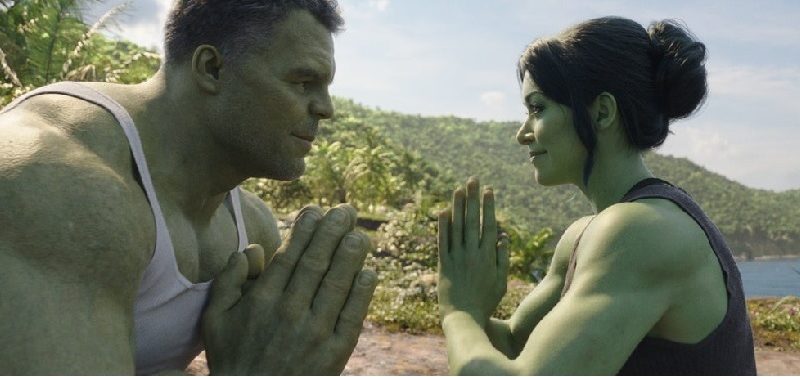She-Hulk: Attorney at Law
She-Hulk: Attorney at Law is a 30-minute Marvel Sitcom. Judging by the first two episodes, the “Attorney at Law” part of the title will be more important than the “She-Hulk” part of the title. That makes some sense. Courtroom dramas utilized limited settings and are mostly talk, so that can keep the costs down enough to put more money into the CGI.
Jennifer Walters (Tatiana Maslany) gets into a car accident with her cousin, Bruce Banner. She is exposed to his blood and, presto, she is now the She-Hulk. On the courtroom side, her newfound powers and pseudo-celebrity get her roped into a case involving Abomination (Tim Roth), who decides to take the Nuremburg defense out for a spin and see how it plays in a superhero world.
The jokes here are pretty soft. Women’s clothes are more expensive, so Jennifer doesn’t want to ruin shoes when she transforms into the She-Hulk. Bruce is jealous of Jennifer’s ability to better control her transformations, something he had to work years to try to attain. These jokes point to relevant cultural themes about gender, but the show rarely does more than gesture at them. In a thirty-minute sitcom, there is rarely time to state the joke, much less set it up. So nothing lands hard in the show, and it exists in the margins. Too self-serious to be funny (is any MCU product outside of Deadpool funny?), too rushed and superficial to be moving.
Apologies if that makes the show sound bad when it is really just blah. The worst thing I can say about She-Hulk applies as well to most of Marvel television and, honestly, a lot of their movies. It leans heavily on the increasingly implausible idea that the world the characters live in is in all respects like ours, just with superheroes. Thinking about how our legal system might address themes in an MCU show is not the same as postulating that our legal system (or government or culture or theology or any aspect of our lives) would remain fixed and simply assimilate cataclysmic events and superbeings.
The best thing I can say about the show (and those like it) is that it has potential to work as a thought experiment. Good speculative fiction can postulate one or two changes to reality and make interesting guesses about how reality would respond to them. This is why I think the shows (and increasingly the movies) work better as one-offs in isolation than as parts of a Marvel Cinematic “Universe.” At a certain point, the stipulated alterations of reality become so numerous, we no longer see any connections between the speculative universe and the actual one, except perhaps roughly allegorical or broadly thematic ones.
In short, the MCU is now a work of fantasy that continues from time to time to try to pose, unconvincingly, as a work of speculative fiction. The closer to ground-level the characters are, the more time they occupy in the “real” world, the less convincing any of it is. (The one exception to that principle was the Netflix Jessica Jones show, but I’ll riff on that another day.)
The skinny: She-Hulk is adequate content for the Disney+ platform, but that content really is not that different in quality or approach from the content on any other platform or even on network television.

